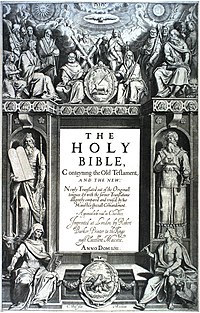Lewis
Member
- Aug 5, 2005
- 15,483
- 621
The Authorized Version, commonly known as the King James Version, King James Bible or KJV, is an English translation of the Christian Bible by the Church of England begun in 1604 and completed in 1611.<sup id="cite_ref-2" class="reference">http://en.wikipedia.org/wiki/Authorized_King_James_Version#cite_note-2</sup> First printed by the King's Printer Robert Barker,<sup id="cite_ref-3" class="reference">http://en.wikipedia.org/wiki/Authorized_King_James_Version#cite_note-3</sup><sup id="cite_ref-4" class="reference">http://en.wikipedia.org/wiki/Authorized_King_James_Version#cite_note-4</sup> this was the third official translation into English; the first having been the Great Bible commissioned by the Church of England in the reign of King Henry VIII, and the second was the Bishop's Bible of 1568.<sup id="cite_ref-Daniell_2003_204_5-0" class="reference">http://en.wikipedia.org/wiki/Authorized_King_James_Version#cite_note-Daniell_2003_204-5</sup> In January 1604, King James I of England convened the Hampton Court Conference where a new English version was conceived in response to the perceived problems of the earlier translations as detected by the Puritans,<sup id="cite_ref-Daniell_2003_435_6-0" class="reference">http://en.wikipedia.org/wiki/Authorized_King_James_Version#cite_note-Daniell_2003_435-6</sup> a faction within the Church of England.<sup id="cite_ref-7" class="reference">http://en.wikipedia.org/wiki/Authorized_King_James_Version#cite_note-7</sup>
James gave the translators instructions intended to guarantee that the new version would conform to the ecclesiology and reflect the episcopal structure of the Church of England and its beliefs about an ordained clergy.<sup id="cite_ref-Daniell_2003_439_8-0" class="reference">http://en.wikipedia.org/wiki/Authorized_King_James_Version#cite_note-Daniell_2003_439-8</sup> The translation was done by 47 scholars, all of whom were members of the Church of England.<sup id="cite_ref-Daniell_2003_436_9-0" class="reference">http://en.wikipedia.org/wiki/Authorized_King_James_Version#cite_note-Daniell_2003_436-9</sup> In common with most other translations of the period, the New Testament was translated from Greek, the Old Testament was translated from Hebrew text, while the Apocrypha were translated from the Greek and Latin. In the Book of Common Prayer (1662), the text of the Authorized Version replaced the text of the Great Bible – for Epistle and Gospel readings – and as such was authorized by Act of Parliament.<sup id="cite_ref-Daniell_2003_488_10-0" class="reference">http://en.wikipedia.org/wiki/Authorized_King_James_Version#cite_note-Daniell_2003_488-10</sup> By the first half of the 18th century, the Authorized Version was effectively unchallenged as the English translation used in Anglican and Protestant churches. Over the course of the 18th century, the Authorized Version supplanted the Latin Vulgate as the standard version of scripture for English speaking scholars

James gave the translators instructions intended to guarantee that the new version would conform to the ecclesiology and reflect the episcopal structure of the Church of England and its beliefs about an ordained clergy.<sup id="cite_ref-Daniell_2003_439_8-0" class="reference">http://en.wikipedia.org/wiki/Authorized_King_James_Version#cite_note-Daniell_2003_439-8</sup> The translation was done by 47 scholars, all of whom were members of the Church of England.<sup id="cite_ref-Daniell_2003_436_9-0" class="reference">http://en.wikipedia.org/wiki/Authorized_King_James_Version#cite_note-Daniell_2003_436-9</sup> In common with most other translations of the period, the New Testament was translated from Greek, the Old Testament was translated from Hebrew text, while the Apocrypha were translated from the Greek and Latin. In the Book of Common Prayer (1662), the text of the Authorized Version replaced the text of the Great Bible – for Epistle and Gospel readings – and as such was authorized by Act of Parliament.<sup id="cite_ref-Daniell_2003_488_10-0" class="reference">http://en.wikipedia.org/wiki/Authorized_King_James_Version#cite_note-Daniell_2003_488-10</sup> By the first half of the 18th century, the Authorized Version was effectively unchallenged as the English translation used in Anglican and Protestant churches. Over the course of the 18th century, the Authorized Version supplanted the Latin Vulgate as the standard version of scripture for English speaking scholars






